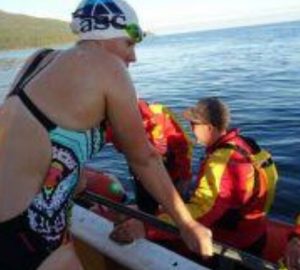What to do if your swim is cancelled
Swim cancellations and postponements are a fact of life, especially in places with fickle weather. This week I had hoped to write a different story about a lovely swim across the Solent to the Isle of Wight. Unfortunately, that swim didn’t happen.
On the scale of swim cancellations, I guess this doesn’t rank too highly. I’ve come across prospective English Channel swimmers who have spent two or more years training hard, invested thousands in coaching services and spent generously on travel (some coming half way around the world) and accommodation, only to sit mournfully in Dover waiting for the weather to calm.
Still, swimming to the Isle of Wight is a bucket list swim and a nice one for the CV and my accommodation was booked and paid for. Twenty other people were due to swim with me and some have raised significant sums for the Ellen MacArthur Cancer Trust. Having told people I was going to do the swim, it’s a bit of a letdown to say I didn’t do it because it was too windy.
“How can you let a bit of stiff breeze stop you swimming?” you hear them ask. “What’s the matter with you?”
Which is one of the reasons swimmers shouldn’t make the final decisions on swim safety. Looking across to the Isle of Wight on Sunday, we could see the water was a bit choppy, but surely that just adds to the fun, right?
I’ve been in other situations where events have been cancelled. It’s not uncommon in these scenarios to overhear a bunch of swimmers grumbling and saying things like, “well, I don’t see the problem. I could swim in that.”
But that misses the point. The safety decision is not taken on behalf of the strongest swimmers in the event but on those with less experience, and also the safety crew.
The concept of “letting swimmers choose for themselves” doesn’t carry that much weight either because those with the least experience will be least equipped to make safety decisions and will look to people with more experience for guidance.
It also makes no sense to put the safety crew into situations where they have trouble controlling their craft. If kayakers have to focus most of their attention on staying upright they won’t be watching the swimmers as closely as they should be. Also, in rough seas it’s frightening how quickly you can lose sight of someone in the water. You might be able to swim in those conditions but you are not the only person putting themselves at risk. Why should you put someone else in danger?
So, the first thing to do when your swim is cancelled is to accept the decision gracefully and gratefully, even if you disagree with it. Remember that it’s not taken just for your benefit. The weather is beyond all of our control so there’s little point getting angry about it.
Secondly, let the event organiser know that you support and respect their decision. They won’t have made it lightly and they may well be getting a lot of flak from other swimmers. It will almost certainly be costing them money too.
Next, make the most of the time freed up by the cancellation. If you’ve already travelled to the event, explore the local area and perhaps find a safe swim you could do on your own. On our way back from Gosport we first found a fantastic and almost deserted beach (yes, they do exist on the South Coast) and then stopped off near Guildford for a swim in the River Wey. Alternatively, do the weather conditions open up other options? The windersurfers were flying in Stokes Bay on Sunday morning, for example.
Finally, if this was a major event on your calendar, can you use your hard-won fitness for something else? There are plenty more swimming events to choose from. They might not tick all the boxes that your big swim would have done but finding an alternative goal is a good way of not getting too despondent about your main event.
It’s normal to be disappointed so there’s no point pretending otherwise but do what you can to minimise that disappointment. Hopefully your main event is merely postponed rather than cancelled so with a bit of luck you’ll still get it done, just not exactly when you wanted.
Image: The deserted beach at Church Norton






